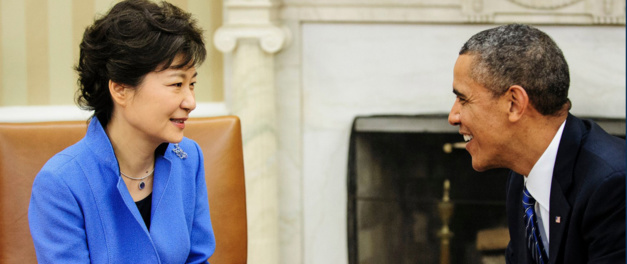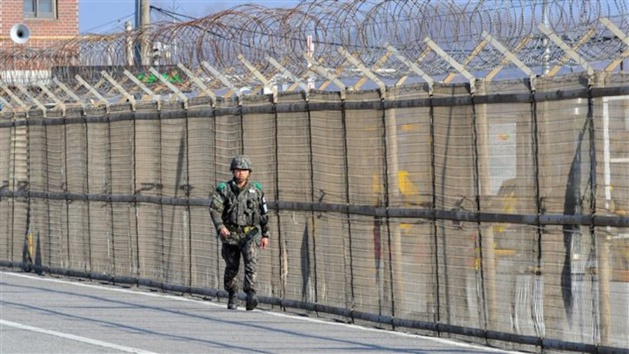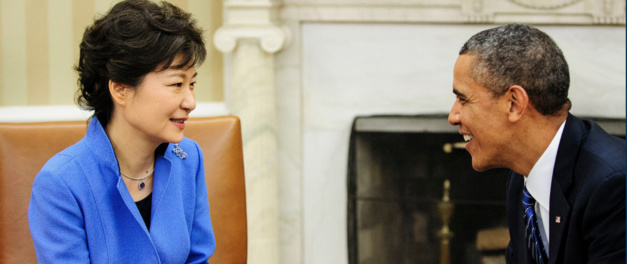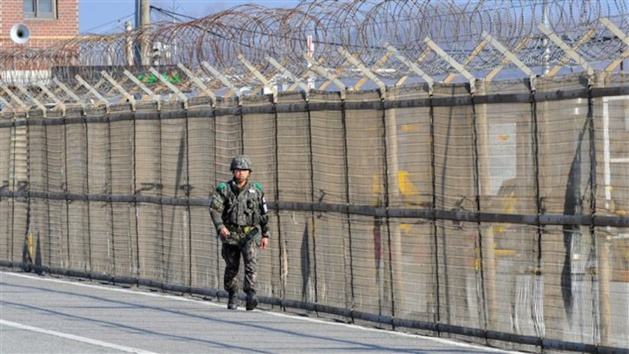
Photo Credit: Rights Reserved
Diplomatic relations between the United States and South Korea were strengthened following the Korean War. The two countries first signed a military alliance in 1953. This agreement would designate the presence of close to 29,000 soldiers of the American Army permanently. Furthermore, for several decades there has been a joint military division between the United States and South Korea to carry out military operations in the Korean peninsula. This Combined Forces Command was put in place following the Korean War, in 1978. The soldiers are authorized to regularly conduct bilateral military drills with the goal of preventing an eventual North Korean invasion. The United States has command of these operations. For more than fifty years, the military operations organized the length of the demilitarized zone between the two Koreas are done under the direct command of the United States.
command of the United States.
 command of the United States.
command of the United States.
The South Korean and American military alliance states that in the case of war, the United States wields military control of South Korea. More specifically, these annual operations are composed of two exercises: the “Key Resolve” exercise, a set of computer simulations that last a week, and the annual operation “Foal Eagle”, which mobilizes the land, air and navy forces for eight consecutive weeks.
These joint military exercises, carried out annually, have a defensive objective, but North Korea considers them to be provocations. In 2007, an agreement was signed between the United States and South Korea forecasting the dissolution of the Combined Forces Command in April 2012-a deadline later pushed back to 2015. Yet, 2015 has arrived, and the two countries still intend to carry out their exercises. Furthermore, on January 16, the United States and South Korea officially inaugurated their new joint military division in charge of operations in times of war.
The creation of this new division responds to the different North Korean threats that have multiplied in 2014: notably the cyber-attacks one of which Sony Pictures Entertainment were the victims. According to the agreement between Washington and Seoul, in times of war, the joint staff will control an infantry division as well as a South Korean mechanized brigade. The Combined Forces Command thus does not seem to be dissolving, and the military relations between the United States and South Korea are strengthening around the Korean peninsula.
Efforts at talks on the part of Pyongyang
The last few weeks, the DPRK (Democratic People’s Republic of Korea) has made numerous attempts at negotiation with regard to South Korea and the United States, in a large way to get out of the economic and political isolation that weighs heavy on the country’s finances . In effect, since the start of January, Washington has chosen to increase the economic sanctions with regard to North Korea, following the cyber-attacks against Sony Pictures Entertainment Inc. For the moment, the economic sanctions put in places against North Korea have had a limited impact, but the new sanctions could cause opening actions on the part of Pyongyang. It is worth noting that such economic sanctions have previously been effective against other countries such as Russia and Iran. North Korea thus offered, on January 9, to temporarily suspend its nuclear efforts if the United States would stop its military exercises with South Korea, a proposition rapidly rejected by Washington.
. In effect, since the start of January, Washington has chosen to increase the economic sanctions with regard to North Korea, following the cyber-attacks against Sony Pictures Entertainment Inc. For the moment, the economic sanctions put in places against North Korea have had a limited impact, but the new sanctions could cause opening actions on the part of Pyongyang. It is worth noting that such economic sanctions have previously been effective against other countries such as Russia and Iran. North Korea thus offered, on January 9, to temporarily suspend its nuclear efforts if the United States would stop its military exercises with South Korea, a proposition rapidly rejected by Washington.
 . In effect, since the start of January, Washington has chosen to increase the economic sanctions with regard to North Korea, following the cyber-attacks against Sony Pictures Entertainment Inc. For the moment, the economic sanctions put in places against North Korea have had a limited impact, but the new sanctions could cause opening actions on the part of Pyongyang. It is worth noting that such economic sanctions have previously been effective against other countries such as Russia and Iran. North Korea thus offered, on January 9, to temporarily suspend its nuclear efforts if the United States would stop its military exercises with South Korea, a proposition rapidly rejected by Washington.
. In effect, since the start of January, Washington has chosen to increase the economic sanctions with regard to North Korea, following the cyber-attacks against Sony Pictures Entertainment Inc. For the moment, the economic sanctions put in places against North Korea have had a limited impact, but the new sanctions could cause opening actions on the part of Pyongyang. It is worth noting that such economic sanctions have previously been effective against other countries such as Russia and Iran. North Korea thus offered, on January 9, to temporarily suspend its nuclear efforts if the United States would stop its military exercises with South Korea, a proposition rapidly rejected by Washington.
The joint military maneuvers predicted in February will instead be reported later in the year, in response to opposition from Pyongyang. The South Korean Minister of Unification, Ryoo Kihl-jae, has nevertheless announced himself to be available to meet representatives of the DPRK in order to discuss the reunion of families separated by the war, as well as events organized in honour of the 70th anniversary of the division of the Korean peninsula. It may be recalled that the last official meeting between the countries was back in February 2014. This meeting sought to establish negotiations concerning the reunion of these families separated by the division of the two Koreas. These negotiations were terminated rather quickly with a return of military tension in the peninsula

The denuclearization of the Korean peninsula, a key issue
North Korea committed itself to a nuclear program in 2003. Since then, it has multiplied its nuclear efforts in a goal of intimidation of neighbouring countries. In the setting of the denuclearization of the Korean peninsula, South Korea, China and the United States are currently in the process of increasing their collaboration. The South Korean Minister of Foreign Affairs aims to prevent the North Korean nuclear program from weighing on inter-Korean relations. The improvement of these relations would favour the program of denuclearization of the peninsula. To this effect, South Korea has proposed holding discussions between the two Koreas, from the start of 2015, so as to tackle all the problems concerning the peninsula and to avoid at the same time a fourth nuclear effort by the DPRK. South Korea has suggested relaunching the six-party talks, initiated in August 2003 involving Russia, the United States, China and Japan as well as the two Koreas-that at this point have not been seen for seven years.
January 28 2015, American, South Korean and Japanese nuclear emissaries met in Japan with the view of restarting talks with the DPRK. Sung Kim, special representative of the United States on the case of North Korea, declared during a press conference the DPRK “has to show its engagement with denuclearisation in a concentrated manner before we can restart serious negotiations.”
Military information at the heart of international relations.
South Korea, Japan and the United States have jointly decided to establish a network of military intelligence between the countries to survey the potential North Korean nuclear efforts. Thus, a trilateral agreement was introduced between these three countries at the end of December 2014. This agreement guarantees the sharing of military intelligence, notably concerning the ballistic or nuclear threats posed by North Korea.
the potential North Korean nuclear efforts. Thus, a trilateral agreement was introduced between these three countries at the end of December 2014. This agreement guarantees the sharing of military intelligence, notably concerning the ballistic or nuclear threats posed by North Korea.
 the potential North Korean nuclear efforts. Thus, a trilateral agreement was introduced between these three countries at the end of December 2014. This agreement guarantees the sharing of military intelligence, notably concerning the ballistic or nuclear threats posed by North Korea.
the potential North Korean nuclear efforts. Thus, a trilateral agreement was introduced between these three countries at the end of December 2014. This agreement guarantees the sharing of military intelligence, notably concerning the ballistic or nuclear threats posed by North Korea.
According to the agreement signed in 1987 between Seoul and Washington, and then later between Tokyo and Washington, Japan and South Korea, they will not exchange any information, intelligence only shared uniquely by way of the United States, with the consent of the two countries. This intelligence also concerns visual and oral threats coming from Pyongyang.
South Korean and American relations are not free from tension.
The military relations between the United States and South Korea are not exempt from tension and military errors. By the Stats of Forces Agreement, US soldiers benefit from an extraterritorial privilege, a status that also covers South Korean soldiers. In other terms, judiciary affairs involving American soldiers stationed in South Korea are not judged by South Korean tribunals, but American ones, and vice versa regarding Korean soldiers. Yet, this agreement is criticized by a large part of the South Korean population that denounce criminal acts by numerous American soldiers remaining unpunished.
South Korean soldiers. In other terms, judiciary affairs involving American soldiers stationed in South Korea are not judged by South Korean tribunals, but American ones, and vice versa regarding Korean soldiers. Yet, this agreement is criticized by a large part of the South Korean population that denounce criminal acts by numerous American soldiers remaining unpunished.
 South Korean soldiers. In other terms, judiciary affairs involving American soldiers stationed in South Korea are not judged by South Korean tribunals, but American ones, and vice versa regarding Korean soldiers. Yet, this agreement is criticized by a large part of the South Korean population that denounce criminal acts by numerous American soldiers remaining unpunished.
South Korean soldiers. In other terms, judiciary affairs involving American soldiers stationed in South Korea are not judged by South Korean tribunals, but American ones, and vice versa regarding Korean soldiers. Yet, this agreement is criticized by a large part of the South Korean population that denounce criminal acts by numerous American soldiers remaining unpunished.
The recent declassification of American military documents has put acts of violence committed by the GIs during the Korean War back on the agenda, abuses which for fifty years have been a source of tension between the two countries. The growing importance of the influence of Chinese economic power in the Korean peninsula poses further risks for the relations between the United States and Korea, the American influence capable of decreasing if the diplomatic and legal relations are not rethought and re-enforced.





























